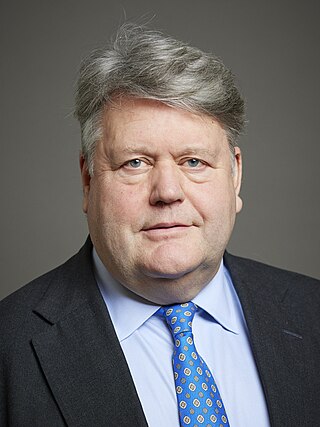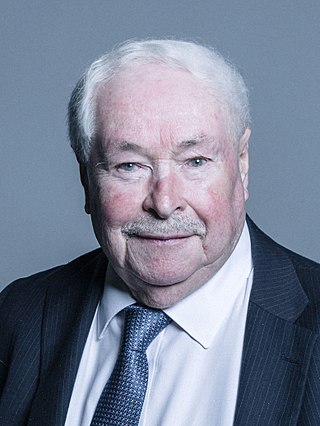
The House of Lords is the upper house of the Parliament of the United Kingdom. Like the lower house, the House of Commons, it meets in the Palace of Westminster in London, England. One of the oldest institutions in the world, its origins lie in the early 11th century and the emergence of bicameralism in the 13th century.
Peerages in the United Kingdom form a legal system comprising both hereditary and lifetime titles, composed of various ranks, and within the framework of the Constitution of the United Kingdom form a constituent part of the legislative process and the British honours system. The British monarch is considered the fount of honour and is notionally the only person who can grant peerages, though there are many conventions about how this power is used, especially at the request of the British government. The term peerage can be used both collectively to refer to the entire body of titled nobility, and individually to refer to a specific title. British peerage title holders are termed peers of the Realm.

The Peerage Act 1963 is an Act of the Parliament of the United Kingdom that permits women peeresses and all Scottish hereditary peers to sit in the House of Lords and allows newly inherited hereditary peerages to be disclaimed.
John Anderson Cunningham, Baron Cunningham of Felling, PC, DL is a British politician who was a Labour Member of Parliament for over 30 years, serving for Whitehaven from 1970 to 1983 and then Copeland until the 2005 general election, and had served in the Cabinet of Tony Blair.

Thomas Galloway Dunlop du Roy de Blicquy Galbraith, 2nd Baron Strathclyde,, known informally as Tom Strathclyde, is a British Conservative politician. Lord Strathclyde served in the political role of Leader of the House of Lords from the 2010 general election until January 2013 and as Chancellor of the Duchy of Lancaster, having been Leader of the Opposition in the House of Lords (1998–2010).

The House of Lords Act 1999 is an Act of the Parliament of the United Kingdom that reformed the House of Lords, one of the chambers of Parliament. The Act was given Royal Assent on 11 November 1999. For centuries, the House of Lords had included several hundred members who inherited their seats ; the Act removed such a right. However, as part of a compromise, the Act did permit ninety-two hereditary peers to remain in the House. Another ten were created life peers to enable them to remain in the House.

Alexander Charles Carlile, Baron Carlile of Berriew, is a British barrister and crossbench member of the House of Lords. He was the Member of Parliament (MP) for Montgomeryshire from 1983 to 1997.

Dafydd Wynne Wigley, Baron Wigley, is a Welsh politician who served as the leader of Plaid Cymru from 1981 to 1984 and again from 1991 to 2000. He served as the Member of Parliament (MP) for Caernarfon from 1974 to 2001 and as the Member of the Welsh Assembly for Caernarfon from 1999 to 2003. In 2010, Wigley was granted life peerage, taking his seat in the House of Lords in 2011.

Giles Heneage Radice, Baron Radice, was a British Labour Party politician and author. He served as a Member of Parliament (MP) from 1973 to 2001, representing part of County Durham, and then as a life peer in the House of Lords from 2001 until shortly before his death in 2022.
In the United Kingdom, life peers are appointed members of the peerage whose titles cannot be inherited, in contrast to hereditary peers. Life peers are appointed by the monarch on the advice of the prime minister. With the exception of the Dukedom of Edinburgh awarded for life to Prince Edward in 2023, all life peerages conferred since 2009 have been created under the Life Peerages Act 1958 with the rank of baron and entitle their holders to sit and vote in the House of Lords, presuming they meet qualifications such as age and citizenship. The legitimate children of a life peer appointed under the Life Peerages Act 1958 are entitled to style themselves with the prefix "The Honourable", although they cannot inherit the peerage itself. Prior to 2009, life peers of baronial rank could also be so created under the Appellate Jurisdiction Act 1876 for senior judges.

Anthony Fitzhardinge Gueterbock, 18th Baron Berkeley, Baron Gueterbock,, otherwise known as Tony Berkeley, is a British aristocrat and Labour parliamentarian.

Eric Douglas Harvey Hoyle, Baron Hoyle JP is a British politician and life peer who was chair of the Parliamentary Labour Party from 1992 to 1997 and a lord-in-waiting from 1997 to 1999. A member of the Labour Party, he was Member of Parliament (MP) for Nelson and Colne from 1974 to 1979 and Warrington North from 1981 to 1997.
John Donkin Dormand, Baron Dormand of Easington was a British educationist and Labour Party politician from the coal mining area of Easington in County Durham, in the north-east of England. He was Member of Parliament (MP) for the Easington constituency from 1970 until his retirement in 1987.

Stanley Clinton Clinton-Davis, Baron Clinton-Davis, was a British politician and solicitor. A member of the Labour Party, he served as Member of Parliament (MP) for Hackney Central from 1970 to 1983, and was a minister in the Labour governments of Harold Wilson, James Callaghan and Tony Blair. He was European Commissioner in the Delors Commission (1985–1989). In 1990, he became a life peer, sitting on the Labour benches in the House of Lords until his retirement in 2018.

Indarjit Singh, Baron Singh of Wimbledon, sometimes transliterated Inderjit Singh, is a British journalist and broadcaster, a prominent British Indian active in Sikh and interfaith activities, and a member of the House of Lords.
David Edward Lea, Baron Lea of Crondall, OBE is a British former trade unionist and Labour politician.

Thomas Taylor, Baron Taylor of Blackburn, was a businessman and Labour politician. He was a member of Blackburn Council for 22 years, serving as its leader from 1972 to 1976. In 1978, he became a member of the House of Lords. In 2009, he was suspended from the House, along with Baron Truscott, as a result of the cash for influence scandal, the first peers to be suspended since the 17th century.
By-elections to the House of Lords occur when vacancies arise among seats assigned to hereditary peers due to death, resignation, or disqualification. Candidates for these by-elections are limited to holders of hereditary peerages, and their electorates are made up of sitting Lords; in most cases the electorate are those sitting hereditary peers of the same party affiliation as the departed peer.











